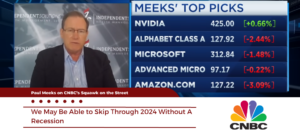Boeing is a big deal. It is one of America’s greatest exporters and we do not export much from this country. Its production of the 787 Dreamliner aircraft in North Charleston is critical to our local economy. Therefore, no surprise, our editor has asked me to revisit the company. I had written an article about Boeing for the Mercury years ago, but lots has changed since I had shared that bullish thesis. I had been right to have recommended it until Boeing’s troubles, serious troubles, began when two of its marquee 737 MAX planes crashed in October 2018 and March 2019, which led to the grounding of this aircraft from March 2019 through December 2020. Of course, during that nastiness, COVID struck and commercial air travel plunged by two-thirds. Last, to rub salt in its wound, Boeing had been and continues to be beset by manufacturing stumbles including a few here at 5400 International Boulevard.
As you know, I mostly write about investing. The stock market typically is an efficient pricing mechanism. Today, it values Boeing at $218 per share, or a total $127 billion plus $57 billion in net (i.e., partially offset by cash) debt. The problem is that at its peak in March 2019 the stock traded at $441, so today you can buy Boeing at about half its glory days price. I remember that Shangri-La. The company had just finished a year in which it had $102 billion in sales of which $9 billion, or $16 per share, had dropped to the bottom line. To put this in perspective, Boeing lost -$13 billion in 2020 on $77 billion in revenue.
During its 2018 and 2019 nirvana, the company’s services business was growing fast. Think of it as Boeing offering Alaska Airlines data analytics software with its jets. Services are sexy. The profit margin is much higher than it is for manufacturing. Services revenues reoccur whereas selling planes is a lumpy business. In that era, some analysts were valuing the company, or at least its emerging services unit, like a Silicon Valley startup. No one sees Boeing that way anymore, so I dissuade you from investing in it with that thesis. In the end, Boeing proved to be a super cyclical company. Therefore, even as the firm rebounds do not expect Boeing’s stock to retest its $441 high.
In addition to Global Services, Boeing reports two other business segments, Commercial Airplanes and Defense, Space and Security. Last quarter, Commercial Airplanes was still depressed due to COVID continuing to stunt business travel and manufacturing miscues, which delayed aircraft deliveries and their revenue recognition, but the group still posted $4.3 billion in sales versus $7.2 billion for Defense, Space and Security and $3.8 billion for Global Services. At this stage of the company’s recovery, only Commercial Airplanes is still bleeding, but it is hemorrhaging less. It had lost -$856 million over the past three months, but it had suffered a -$2.1 billion beating in the same period a year ago.
Luckily, Boeing is and should continue to be an oligopolist in Commercial Airplanes. Particularly for long haul aircraft, there really are only two players, Boeing and Airbus, which is owned by a European consortium including government sponsors. If and when Boeing stops shooting itself in the foot with regulatory and manufacturing nonsense, it has years of ordered planes to deliver. In fact, at the end of May 2021, the company had orders for 4,879 aircraft worth a total $283 billion, which should take over 7 years to deliver as production normalizes, but that will not be anytime soon. If you are a Boeing investor, or if you watch its Commercial Airplanes business, focus on the 737 MAX and not the 787 Dreamliner built in North Charleston. The latter gets local press, but the former moves the needle at the company. It accounts for 82% of the planes (i.e., units and not dollars) backlog. Specifically, as it pertains to North Charleston’s 787 Dreamliner program, Boeing has 484 aircraft in backlog, but the company has only delivered 13 in 2021. Yes, if you keep your job at Boeing despite manufacturing fumbles at our local plant, you still will have years of work to do to fulfill promises to customers.
As you know, I look for just a few “tells” when I evaluate a company. Despite all the hemming and hawing, these are the issues that matter most: In addition to ramping the 737 MAX program, I look for Boeing to pare its debt. It had already been levered and then it desperately borrowed more during COVID, so now the firm owes $64 billion, which is only partially offset by $7 billion in cash. The interest expense due is a tremendous burden. Boeing just replaced its chief financial officer. I will watch how quickly he (Brian West) reduces the company’s debt because while Boeing is returning to profitability and is generating free cash flow (i.e., after maintenance expenditures) its debt load scares me and does not leave much cushion particularly if COVID’s delta variant stifles travel again.
I think that Boeing will be fine over time, but it will not regain its former glory as a company or retest its $441 all-time high stock price. If you own its shares, I would just hold them. If you do not, I think you have better buying opportunities. Feel free to ask me about them.
If you are looking for more blogs by Paul Meeks, check out Tech Stock Rotation Could Be Overdone or Is this 1980? Pray it is Not.





